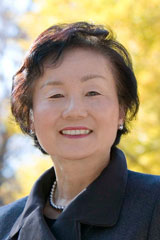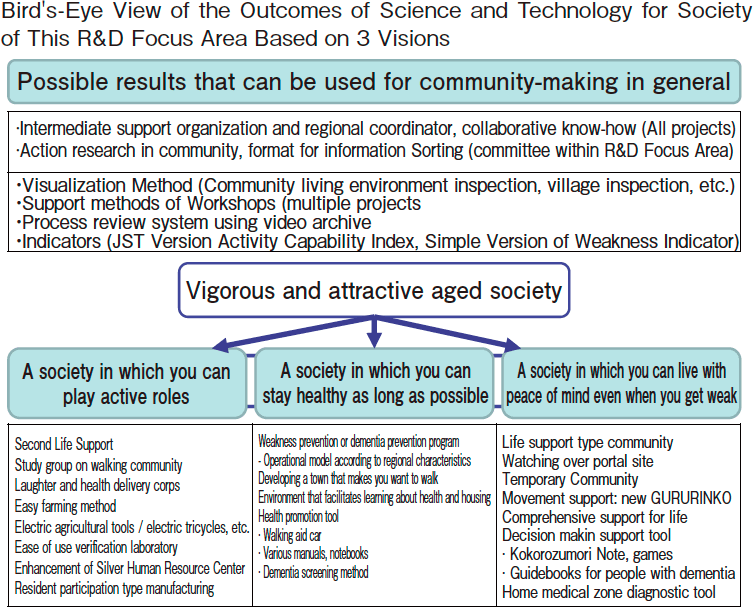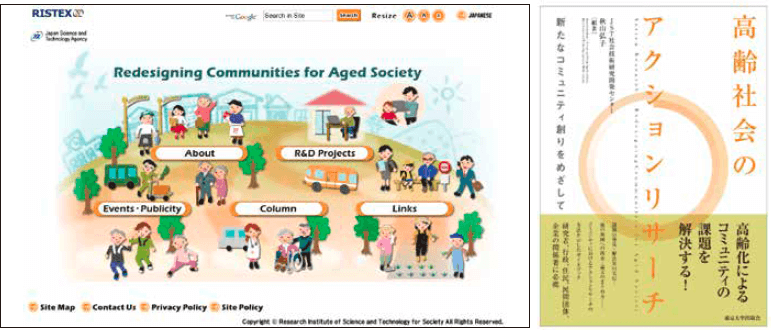It is estimated that, in our country, in 2025, the population of people aged 65 or older will exceed 30% of the total population, which is an increase of over 7 million people nationwide from in 2010. The population increase in urban areas in particular is significant, creating large regional disparities. For solving hardly predictable and complex regional problems due to the advent of an aged society unprecedented in the world, we have been promoting research and development based on trans-disciplinary and multi-stakeholder Collaboration. (Activities ended in March 2016)
Program Supervisor

AKIYAMA Hiroko
Professor, Institute of Gerontology, The University of Tokyo(as of the completion of the R&D Focus Area)
Japan has the greatest longevity of any country in the world. At present, senior citizens(age 65+) account for 23% of the population in Japan. By 2030, this number is expected to increase to one third. Particularly, people aged 75 and older will increase rapidly. Since there is no precedent for this situation anywhere in the world, it is hard to predict what types of problems are likely to occur. Accordingly, there is an urgent need to accurately assess the current situation, identify problems and conduct research to find solutions to the problems.
However, it is difficult to resolve the problem of an aging society through individual efforts. Many of the problems require a multi-disciplinary perspective, which takes into consideration the psychological, physical and social status of the senior citizens. Exploring a problem resolution from various perspectives, including the humanities and the social sciences, will lead to more effective models for the aging society.
RISTEX is now seeking potential solutions to a broad range of problems arising in communities due to population aging.
Goals
- To develop innovative community-based research programs seeking solutions to critical problems arising in the aged society, which involve relevant multi-stakeholders such as scientific disciplines, government agencies, industries and citizens.
- To introduce methodological innovations in research solving problems of the aged society.
- To create a network of R&D centers which will serve as the resource center for redesigning communities for the aged society.
Message from the Area Director
Older-old population is rapidly increasing in Japan. By next 20 years, people aged 75+ will double in number and account for 20% of the total population. More specifically, population aging is drastic in urban areas. A large number of young people seeking good jobs moved from rural areas to metropolitan areas during the period of rapid economic growth in the 1960s and 70s. They are now reaching retirement age. Although population aging has been an issue in rural areas for a long time, it is increasingly becoming an urban issue in Japan. In year 2030, it is also predicted that 10% of people aged 65+ will be demented and 45% will be living alone. Many people in their 80s and 90s will be living alone.
In a study launched in 1987 to track the aging patterns of 6,000 elderly people, it has been shown that 80% were healthy enough to live alone until their mid-70s, then, began to see a gradual decline in their self-sustainability. Given that the population aged 75+ is expected to double in the next 20 years, it is clear that quick action is needed. One thing that we need do is to find a way to delay, by even two or three years, the age at which people start losing sustainability - in other words, to extend people's healthy life expectancy. Another is to build a social infrastructure that can support the lifestyles of elderly people who need assistance
The existing infrastructure of communities was built when the population was much younger. We need to redesign both hard and soft infrastructures of communities to meet the needs of the highly aged society. Such effort will require research, design and actions-and collaboration of multi-stakeholders such as a range of academic disciplines, governments, industries and citizens.
Visions Based on the R&D Focus Area Outcomes
The issue of aging becomes evident in the “community,” which is a place of living. In this program, 15 projects yielded various outcomes concerning specific problems associated with aging in diverse communities with different characteristics of culture/climate/resource, etc. The created various methods, actions and images of community are, while being connected with each other, arranged as follows together with the image of aged society to be aimed at.
At present, we are deploying activities in the “Implementation-Support Program (R&D results Integrated Type)” for further dissemination and establishment of these outcomes in society. (Activities ended in March 2019)
- A society in which you can play active roles
... Draw a picture of being active for lifetime through activities from work to social contribution. - A society in which you can stay healthy as long as possible
... Develop know-how of health promotion rooted in the community. - A society in which you can live with peace of mind even when you get weak
... Realize an area in which you can live “with peace of mind” and “in your own manner” for ever.

Dissemination of the Program/Project Outcomes
The outcomes of this R&D Focus Area’s projects and records of the program activities are disclosed on the program website (https://www.jst.go.jp/ristex/korei/en/) (photo at left). In the program, also, community action research was promoted/discussed, and the results were summarized in the book “Aged Society Action Research” (photo at right).

R&D Projects
FY2012
Category I
|
Promoting Public Consciousness of Decision-making on Elderly Care |
2012.10-2015.9 |
|---|---|
|
Health Care Decision-making Support for People with Dementia in Japan |
2012.10-2015.9 |
Category II
|
Housing and Healthy Aging |
2012.10-2015.9 |
|---|---|
|
Network Community for Refugees Dispersed in a Wide Area |
2012.10-2015.9 |
|
Community Design for Preventing Dementia |
2012.10-2015.9 |
|
Community design by functional integration for 2030 |
2012.10-2015.9 |
FY2011
Category II
|
Expanding Social Capital in a Community by Utilizing Assistive Technology for Walking |
2011.10-2014.9 |
|---|---|
|
Community Design for Temporal Housing Sites in the Tsunami Stricken Area |
2011.10-2014.9 |
|
Development of a Community-based Comprehensive System for Prevention of Frailty in Late Life |
2011.10-2014.9 |
|
Innovations in Age-friendly Farming |
2011.10-2014.9 |
|
Founding the Center for Usability and Aging Research (CUAR) with senior citizens |
2011.10-2014.9 |
FY2010
Category I
|
Development of an Area Diagnosis Tool for Promoting Home Medical Care |
2010.10-2013.9 |
|---|---|
|
Development of a New "Index of Competence" Reflecting Improved Health Status of the Elderly |
2010.10-2013.9 |
Category II
|
Aging in Place with ICT |
2010.10-2013.9 |
|---|---|
|
Senior Citizens' New Career Model in the Community |
2010.10-2013.9 |
Category I: Projects whose goal is to provide options for resolving social problems (the approach to R&D, organization of indicators, etc. for scientific evaluation)
Category II: Projects whose goal is to go all the way to experimental proof of specific technologies, methods etc. to help resolve social problems